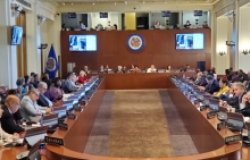Wilson Center Scholar Walter Reich Honored by AAAS for Uncovering Soviet Abuse of Psychiatry
Reich's work for which he received this award was completed in part during a fellowship at the Wilson Center in the 1980s.
Walter Reich, current Wilson Center senior scholar, has been named to receive the highly coveted 2003 American Association for the Advancement of Science (AAAS) Scientific Freedom and Responsibility Award. The award is presented annually to honor scientists and engineers whose exemplary actions have served to foster scientific freedom and responsibility. The AAAS chose Reich for strongly advocating human rights, effectively protesting crimes against humanity, and promoting the social responsibilities of health care professionals and scientists.
While a fellow at the Wilson Center in the 1980s, Reich studied the political abuse of psychiatry in the Soviet Union; the psychology of terrorism; and the scientific, ethical and public policy dimensions of health care. Reich earned his bachelor's degree in 1965 from Columbia University and his M.D. in 1970 from the New York University School of Medicine. In 1973, following his psychiatric residency at the Yale University School of Medicine, Reich joined the National Institute of Mental Health in Bethesda, MD.
In the 1970s, Reich learned how the adoption of pseudo-scientific psychiatric diagnostic system in the Soviet Union served to curb dissent and stifle dissenters. He worked assiduously to educate policymakers and members of the scientific and psychiatric communities regarding this distortion of psychiatry. Reich's revelations shocked the international community, and his persistence paid off when the international psychiatric association adopted a position condemning these practices, despite the objections of the Soviets and their allies.
Reich's systematic investigation of Soviet psychiatric practices, including interviews with leading Soviet psychiatrists, taught him that many practitioners in that country were cynically using the system to stifle dissent, while others genuinely believed that anyone who disagreed with the Soviet system and government must be mentally ill. Dissenters were often diagnosed as suffering from "sluggish schizophrenia," an illness not recognized by physicians in any other country. This abuse of psychiatry allowed the Soviet government to hospitalize dissidents, thus avoiding embarrassing public trials. In fact, dissenters, including those undergoing extreme and risky treatments, began to question their own sanity. Understanding as he did that of all the medical specialties, psychiatry is perhaps most at risk for this type of misuse, Reich also examined diagnostic practices in the United States, to ensure that similar abuses would not occur. This examination led Reich to the conclusion that in this country, aberrant and unacceptable behavior is increasingly excused by attaching a psychiatric labeled to it, thereby undermining the concept of personal responsibility for one's behavior.
Reich is the Yitzhak Rabin Memorial Professor of International Affairs, Ethics and Human Behavior at George Washington University. He is also a contributing editor of the Wilson Quarterly, a lecturer in psychiatry at Yale University, and a professor at the Uniformed Services University of the Health Sciences. Born in wartime Poland, he has written extensively on instances of genocide in the world today, and served as director of the United States Holocaust Memorial Museum from 1995-1998, where he founded the Center for Advanced Holocaust Studies and oversaw the creation of the Museum's Committee on Conscience, which alerts the world to emerging genocides.
The Award recognizes scientists and engineers who have acted to protect the public's health, safety, or welfare; or focused public attention on important potential impacts of science and technology on society by their responsible participation in public policy debates; or established important new precedents in carrying out the social responsibilities or in defending the professional freedom of scientists and engineers.
This annual award was established in 1980 and consists of a prize of $5,000, a commemorative plaque, complimentary registration, and reimbursement for travel and hotel expenses to attend the AAAS Annual Meeting. "By presenting the Scientific Freedom and Responsibility Award each year, AAAS seeks to inspire the next generation of scientists and engineers as they begin their careers," explained AAAS CEO Alan I. Leshner.










